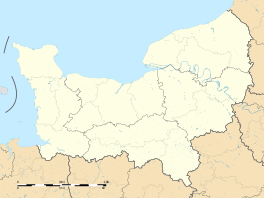Saint Lo
| Saint-Lô | ||
|---|---|---|
| Commune | ||

A view of Saint-Lô from the Notre-Dame church
|
||
|
||
| Coordinates: 49°07′N 1°05′W / 49.12°N 1.09°WCoordinates: 49°07′N 1°05′W / 49.12°N 1.09°W | ||
| Country | France | |
| Region | Normandy | |
| Department | Manche | |
| Arrondissement | Saint-Lô | |
| Canton | Saint-Lô-1 and 2 | |
| Intercommunality | Saint-Loise | |
| Government | ||
| • Mayor (2014–2020) | François Brière | |
| Area1 | 23.19 km2 (8.95 sq mi) | |
| Population (1999)2 | 20,090 | |
| • Density | 870/km2 (2,200/sq mi) | |
| Time zone | CET (UTC+1) | |
| • Summer (DST) | CEST (UTC+2) | |
| INSEE/Postal code | 50502 /50000 | |
| Elevation | 7–134 m (23–440 ft) (avg. 14 m or 46 ft) |
|
|
1 French Land Register data, which excludes lakes, ponds, glaciers > 1 km² (0.386 sq mi or 247 acres) and river estuaries. 2Population without double counting: residents of multiple communes (e.g., students and military personnel) only counted once. |
||
1 French Land Register data, which excludes lakes, ponds, glaciers > 1 km² (0.386 sq mi or 247 acres) and river estuaries.
Saint-Lô (French pronunciation: [sɛ̃lo]) is a commune in north-western France, the capital of the Manche department in the region of Normandy.
Although it is the second largest city of Manche after Cherbourg, it remains the prefecture of the department. It is also chef-lieu of an arrondissement and two cantons (Saint-Lô-1 and Saint-Lô-2).
The commune has 18,931 inhabitants who are called Saint-Lois(es). The names of Laudois(es), Laudien(ne)s or Laudinien(ne)s are also cited. A martyr city of World War II, Saint-Lô was decorated with the Legion of Honour in 1948 and was given the nickname "Capital of the Ruins", a phrase popularised by Samuel Beckett.
Saint-Lô is located in the centre of Manche, in the middle of the Saint-Lois bocage, 57 km (35 mi) to the west of Caen, 78 km (48 mi) south of Cherbourg and 119 km (74 mi) north of Rennes.
The city was born under the name of Briovera on a rocky outcrop of schist belonging to the Armorican Massif, in the Cotentin Peninsula, between the confluences of the Vire – which dominates the city centre – with the Dollée and Torteron, two rivers channelled in their urban sections. This historic heart of the city became L'Enclos, a site well suited to passive defence.
...
Wikipedia



